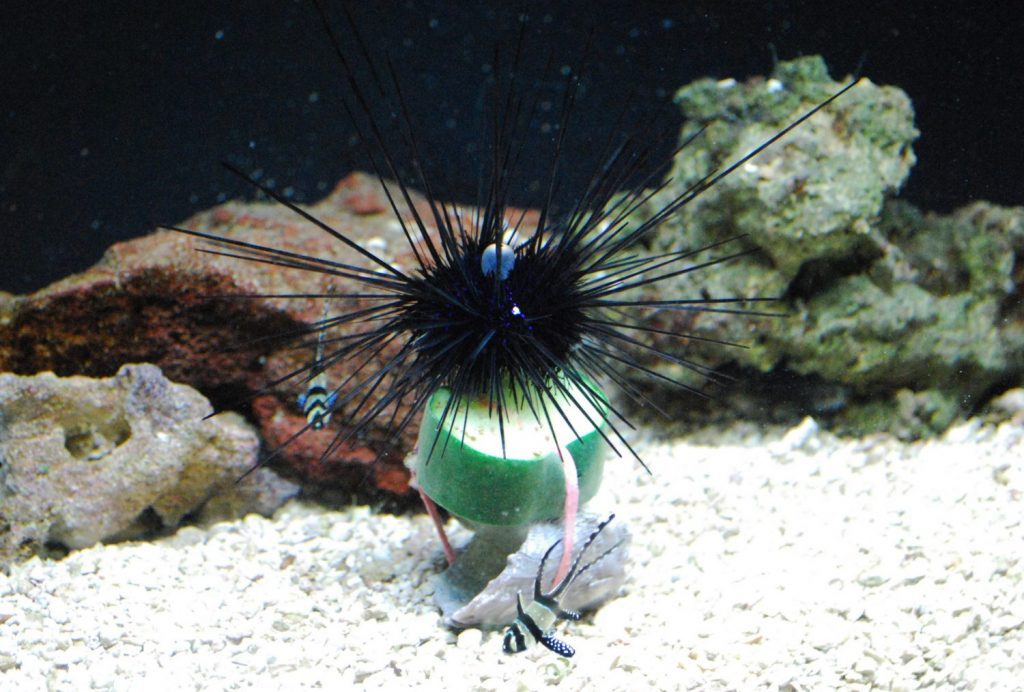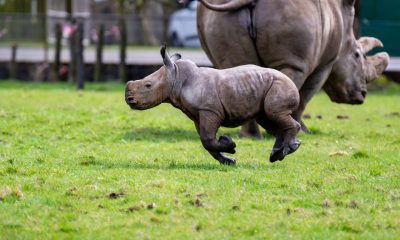Study: Sea urchins emerged 50 million years earlier than thought
The sea urchin is genetically similar to us - with 70 percent of its genes having a human counterpart.
Published
2 years ago onBy
Talker News
By Mark Waghorn via SWNS
The sea urchin emerged 300 million years ago - some 50 million years earlier than previously thought, according to new research.
It survived a mass extinction said to have wiped out more than 80 percent of Earth's species, say scientists.
The humble creature, which resembles an underwater hedgehog, is one of the only invertebrates on the human branch of the evolutionary tree.
It shares a common ancestor - and has genes associated with taste, smell, hearing, balance and surprisingly, even vision.
The finding is based on analyses of sea urchin fossils and family trees of 54 different species.
It sheds light on our own evolution. Seabed cousins like starfish and sea cucumbers also appeared around the same time. They all belong to a group called echinoids.
Co-author Dr. Omri Bronstein, of Tel Aviv University in Israel, said: "Echinoids are also ecologically significant, as they are a major player in the marine environment, at every depth and in every area on the planet, and their disappearance from a particular area brings with it extreme changes.
"An example of this occurred in the 1980s, when the population of sea urchins in the Caribbean was devastated by disease.
"As a result, the algae that used to feed the sea urchins greatly increased their uncontrolled growth, leading to the death of coral reefs.
"And here at home, the echinoid population in the Gulf of Eilat has decreased significantly in recent decades, while on the other hand, certain species of sea urchins from the Red Sea migrated and established themselves in the thousands on the shores of the Mediterranean – two phenomena that raise concerns about disturbing the ecological balance of our shores."
The study in online journal eLife is the most comprehensive of its kind - suggesting many species survived the Permian-Triassic mass extinction 252 million years ago.
Dr. Bronstein said: "Our research focuses on a phylum of marine animals called Echinodermata - 'echino' meaning spiny and 'derm' meaning skin - as many of these animals are covered in spines.
"They include sea urchins, starfish, sea cucumbers, and their relatives. They are marine invertebrates who inhabit the seabed, and are of great importance in the study of evolution.
"On the evolutionary tree, they are located at a junction where the invertebrates and vertebrate diverged."
The extinction, also known as 'The Great Dying', was Earth's worst event. Most life on land and sea was killed off by eruptions.
They produced a "volcanic winter" that drastically lowered temperatures, before a period of violent global warming.
Dr. Bronstein said: "Our work shows modern echinoids emerged approximately 300 million years ago.
"Many of them survived the Permian-Triassic mass extinction event that occurred about 252 million years ago – the most severe biodiversity crisis in Earth's history – and rapidly diversified in its aftermath.
"In this event, which likely occurred as a result of extreme climate change following volcanic eruptions or meteor strikes, about 81% of all marine species and about 83% of all species living on earth at that time became extinct.
"This means that most of the species we know today were created after that dramatic extinction event.
"Our findings have great significance for the study of evolution in general, not just for that of sea urchins.
"They suggest that even when we have an abundance of fossils and very extensive research on a group, as in the case of sea urchins, estimates are likely to err by tens of millions of years.
"This is another reminder that there is still more that is unknown than known in the fascinating study of evolution."
Moreover, echinoids carry great economic importance, with some considered a luxury delicacy in an international market that brings in about $1 billion a year.
These are only some of the reasons why there has been widespread interest in echinoids throughout history, to this day.
The international team combined genetic results with fossil-based dating in order to map the evolutionary history of echinoids more accurately than ever before.
They were stunned by the results which indicate significant errors in the conventional dating of divergence times on the evolutionary tree.
In fact, many events in the group's history occurred up to 50 million years earlier than previously thought.
The sixth mass extinction in Earth's history is already underway owing to manmade climate change.
Dr. Bronstein added: "Today we are also in the midst of a widespread extinction event, only this time human activity seems to be the main driver.
"An in-depth study of past extinction events, the reasons that led to their occurrence, and the species that managed to survive them, may help us deal with the current extinction.
"We also developed a multivariate statistical approach called a 'chronospace' to help visualise and assess the robustness of evolutionary timeline estimates to different choices of the underlying molecular clock model.
"For the future of the earth and the future of the species living on it, including humans, it is crucial to continue and expand our research on the history of the creatures living here – or in one word: evolution."
The sea urchin is genetically similar to us - with 70 percent of its genes having a human counterpart.
It feeds mainly on algae - limiting sea grass and kelp production and consequently the diversity and complexity in communities supported by these producers.
Sea urchins are the main prey of many top predators - including crabs, lobsters, fish, and sea otters.
With a diminishing population of sea otters in California's Monterey Bay, for example, the population of sea urchins has multiplied.
The sea urchins are reportedly chewing up the kelp forest in the area and upsetting the ecosystem.
Humans are also directly affecting sea urchin populations. Sea urchin roe, or ovaries, are a delicacy in Korea and Japan.
Scientists have long used sea urchins to study fertilization and early development in humans.
Stories and infographics by ‘Talker Research’ are available to download & ready to use. Stories and videos by ‘Talker News’ are managed by SWNS. To license content for editorial or commercial use and to see the full scope of SWNS content, please email [email protected] or submit an inquiry via our contact form.
You may like


Metals can heal themselves just like ‘The Terminator’


Two-faced star has hydrogen on one side and helium on other


World’s oldest big game hunting weapon found


An espresso a day could keep Alzheimer’s at bay


Being bipolar significantly raises risk of premature death: study


Soccer players who regularly use head more likely to develop Alzheimer’s
Other Stories


What is the perfect movie length?
Americans are officially over marathon movies. According to new research, the perfect movie length is just 92 minutes. The poll...


Pro mermaid’s career goes swimmingly after overcoming ocean fear
She makes up to $8,000 a show.


Giant prehistoric salmon used tusk-like teeth to fight off predators
The species that grew up to nine feet long lived in the North American Pacific Northwest.


Evidence of Earth’s magnetic field dates back 3.7 billion years
Life on Earth would not be possible without its magnetic field.


Adorable video shows baby rhino enjoying sunshine
By Faye Mayern via SWNS An endangered baby rhino has well and truly found its feet after being filmed playing...
Top Talkers

 Parenting7 days ago
Parenting7 days agoSingle mom details struggles of feeding her 12 kids

 Lifestyle6 days ago
Lifestyle6 days agoWoman regrets her tattoo nightmare: ‘It’s horrendous’

 Good News3 days ago
Good News3 days agoDisabled student takes first steps in 10 years on graduation stage

 Health3 days ago
Health3 days agoNew study reveals ‘old age’ begins later than it used to

 Broadcast1 week ago
Broadcast1 week agoHow hard is it for Americans to live sustainably?

 Wildlife2 days ago
Wildlife2 days agoClever elephant returns visitor’s shoe after falling into enclosure

 Money1 week ago
Money1 week agoOver 40% of Americans have no clue what a 401k is

 Environment1 week ago
Environment1 week agoHow hard is it for Americans to live sustainably?
